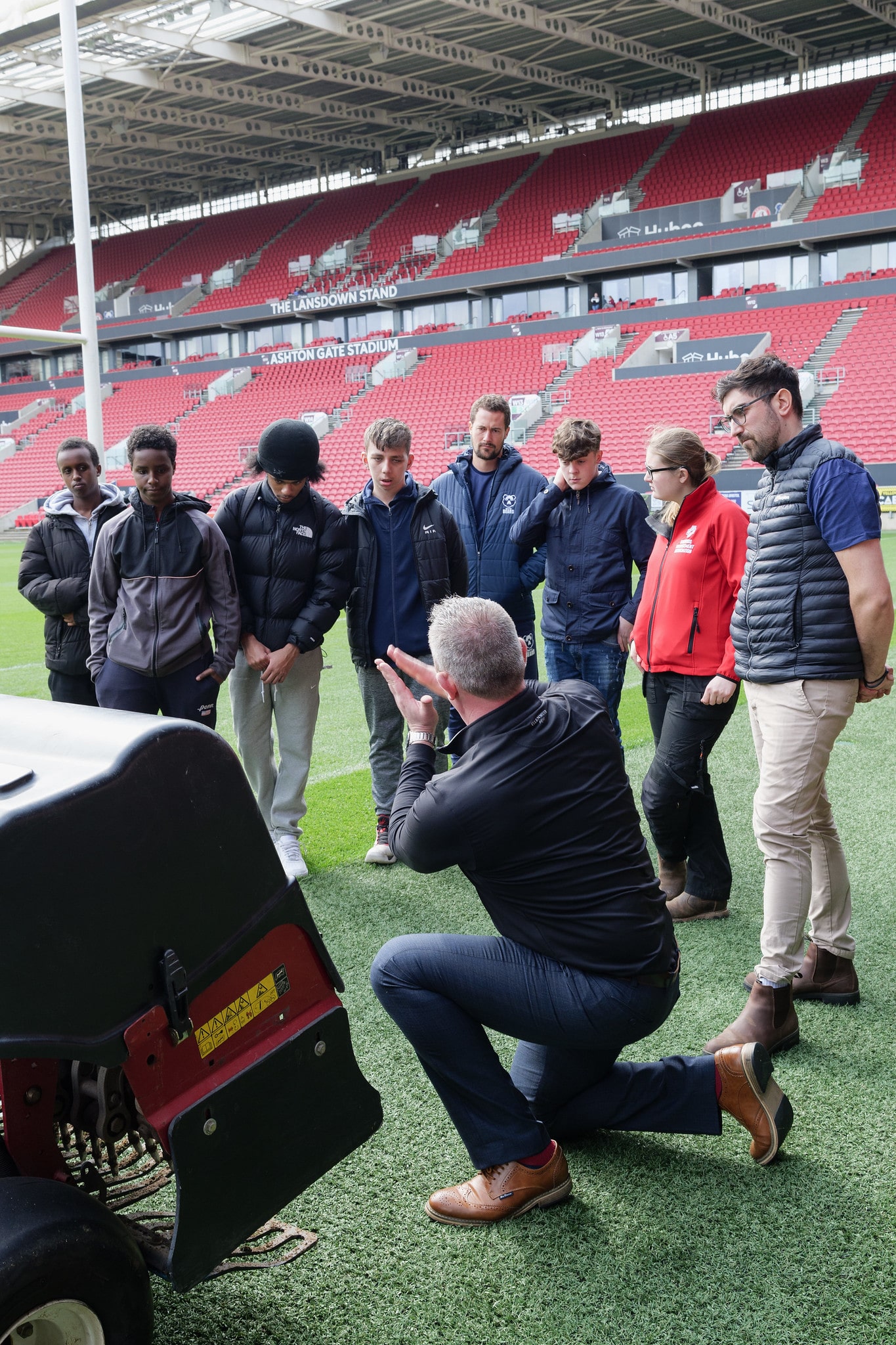Changing the narrative: how we can turn the tide on the UK’s greenkeeping and grounds management recruitment crisis
The greenkeeping and grounds industry is facing a recruitment crisis. Indeed, the last survey done on the subject by BIGGA found a third of greenkeepers were looking for a job outside of the industry and, when trying to replace lost staff, 80 percent of managers found recruitment a struggle.

However, as with any crisis, its extent will be inversely proportional to the action taken to overcome it. As such, it’s important our industry now turns its attention to recovery efforts – for both crisis mitigation and prevention – to ensure the stability, health, and longevity of the UK greenkeeping and grounds industry for many years to come. Here Reesink considers the subject.
What do we mean by a recruitment crisis?
A recruitment crisis occurs when businesses or public organisations struggle to attract and hire qualified candidates for job openings. If unchecked, this can lead to understaffing, and therefore overworking of an already limited workforce, taxing their physical and mental wellbeing; lower productivity, because only so much can be done in a day’s work with fewer staff; and, counterintuitively, increased overheads, since more funds have to be spent on recruitment efforts.
What’s caused the recruitment crisis in the greenkeeping and grounds industry?
The recruitment crisis in the greenkeeping and grounds industry has been caused by numerous factors: demographic shifts, or an ‘ageing’ workforce; skills shortages, lack of training, pay; and wider socioeconomic change in the UK, to name but a few.
A main focal point, however, should be net-negative; that is, there are more skilled and qualified people leaving the industry than there are joining it. By first addressing why people are leaving, and perhaps more importantly in this instance, why so few are joining, we will then be better able to strategise and take action to redress the balance.
According to a 2022 survey by the Grounds Management Association (GMA), about 3,220 professional grounds managers will retire over the next three years. It’s now 2024, which means there’s a hole in our industry that needs filling.

But it’s not just a case of putting job adverts online and waiting for the applications to start flying in – a privilege many other industries might have. Whether we’re talking about golf clubs, sports venues or public organisations, there’s still the perpetuation of negative ideas about careers in greenkeeping and grounds work – that it’s a low-status and low-paying sector with limited career prospects; in other words, that’s it’s a sector on the decline.
As proud members of the greenkeeping and grounds industry, we know for a fact that’s not the case. But, unless we work to prove this wrong, misconceptions such as these will persist.
That’s why, as part of this community, we’re proud to be long-term sponsors of the Agricultural Engineers Association Conference and the annual BALI National Landscape Awards, both of which showcase the incredible work our highly-skilled sector continues to put out year-on-year, and the excellent, high-status employment opportunities it can offer.
Greenkeeping and grounds work requires a special skill set: horticultural knowledge, the ability to work with various turf and grounds machinery, and best practices in environmental stewardship, to name a few; while training programmes and apprenticeships do exist (in fact, they’re something we offer at Reesink), it’s clear young people outside of the industry aren’t necessarily hearing about them.

As the GMA survey points out, only 4 percent of those joining our industry did so because of guidance from their school or careers service. And, if we’re going to replace those retiring, then this needs to change. Failing to do so will mean greenkeeping and groundsmanship remains behind a barrier, exacerbating the skills gap.
Strategies to solve our recruitment crisis
As an industry, then, our main priority should be to address the shortage head on – to put together a coordinated effort to attract young and fresh talent, while also promoting training programmes and educational pathways. Because the clock’s ticking.
We can change the narrative by employing strategic solutions to ensure better recruitment. And that begins by promoting the profession more broadly, but with a specific focus on – and, indeed, by paying a closer attention to – those underrepresented in our industry: young people, people of colour and women.
Figures from BIGGA show our industry comprises 96 percent men, of which 97 percent are white and 36 percent are over 55; while just 3 percent are represented by those aged between 16 and 24. Yet, as many of us will attest, one of the best things about our profession is the diversity of the work. And diverse work requires diverse skill sets.
By highlighting this need for diversity, as well as the myriad opportunities for professional development in our sector, we can engage with the underrepresented demographics of our community, encouraging them into greenkeeping and grounds management, which will then ease the burden of recruitment struggles.

We’ve had the immense pleasure of working closely with BIGGA on the Toro Student Greenkeeper of the Year Awards – an idea we hatched with Toro back in 1989, says Jon Cole, divisional business manager – turfcare, at Reesink. The awards allow course managers and lecturers in the UK to acknowledge their top employees and students by nominating them. Those who win receive life-changing educational prizes, along with rewards for both the runners-up and the nominators.
While it’s great to win, the awards are more a celebration of greenkeeping and the strong cross-association links that act as a supportive backbone to the industry. Therefore, we’d encourage course and club managers to consider nominating their young greenkeeper of the year – because it’s not just a remarkable event to be part of, it’s a vote of confidence in the future of your organisation and the future of our wider industry.
David Timms, national accounts manager at Reesink, explains how Reesink is also thrilled to sponsor the GMA’s NextGen, a brilliant group of likeminded young people, all of whom are under the age of 28 and are enthusiastic about a career in grounds work. By dedicating their time to initiatives like ‘Schools Into Stadia’, which strive to encourage 14-16 year olds to consider careers in groundsmanship, and volunteering at local sports clubs, the NextGen represents yet another vote of confidence in the future of our sector.
David comments: “Reesink is passionate about supporting the progression, development, and future of the grounds industry. To have this kind of access to the next generation helps us engage young people in the possibilities the sector offers. We must congratulate the NextGen for organising a fantastic and worthwhile event we were proud to be a part of.”
In short, then, perhaps the single greatest strategy for solving our recruitment crisis isn’t so much ‘optimising your recruitment channels’, as many online guides would have you believe, but rather it’s really as simple as inspiring confidence in our industry – because confidence is contagious, and in doing so, we can work to transform the negative, erroneous assumptions made about careers in greenkeeping and groundsmanship.
Get involved with awards like Bali National Landscape Awards and the Toro Student Greenkeeper of the Year Awards, and show your support for new people entering the profession – regardless of their race, gender or age.
Let’s make a buzz about our industry and the diverse work and myriad opportunities it can offer – that it’s not just a job, but a career, and an enjoyable, rewarding one at that. Let’s get involved and work together to promote greenkeeping and groundsmanship so schools and careers services want to sing its praises. Only by inspiring that confidence can we redress the balance and futureproof what is undoubtedly a fantastic industry to work in.
For further information, please contact Reesink Turfcare on 01480 226800 or visit reesinkturfcare.co.uk